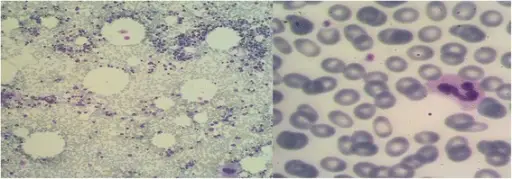Acute immune thrombocytopenic purpura is an acute childhood syndrome where platelets coated with autoantibodies to platelet membrane antigens results in splenic sequestration and mononuclear macrophages phagocytosis.
What is the Pathology of Acute immune Thrombocytopenic Purpura?
The pathology of acute immune thrombocytopenic purpura is:
-Etiology: The cause of acute immune thrombocytopenic purpura is viral illness and drug therapy complications
-Genes involved: Unknown.
-Pathogenesis: The sequence of events that lead to acute immune thrombocytopenic purpura are as the result of the creation of autoantibodies against IIb-IIIa or Ib-IX platelet membrane glycoproteins. Opsonized platelets are considered vulnerable to phagocytosis by the cells of the mononuclear phagocyte system.
-Morphology: The morphology associated with acute immune thrombocytopenic purpura shows megathrombocytes and clumps of platelets.
-Histology: The histology associated with acute immune thrombocytopenic purpura shows increased megakaryocytes.
How does Acute immune Thrombocytopenic Purpura Present?
Patients with acute immune thrombocytopenic purpura typically affect both sexes present at an age range of childhood. The symptoms, features, and clinical findings associated with acute immune thrombocytopenic purpura include prolonged bleeding time, petechiae melena, hematuria.
How is Acute immune Thrombocytopenic Purpura Diagnosed?
Acute immune thrombocytopenic purpura is diagnosed through laboratory studies such as CBC count, peripheral blood smear, bone marrow aspirate shows megakaryocytes number increased. Other tests include bone marrow biopsy, and splenic evaluation.
How is Acute immune Thrombocytopenic Purpura Treated?
Acute immune thrombocytopenic purpura is treated through steroid therapy.
What is the Prognosis of Acute immune Thrombocytopenic Purpura?
The prognosis of acute immune thrombocytopenic purpura is good. The disease is self-limited.



